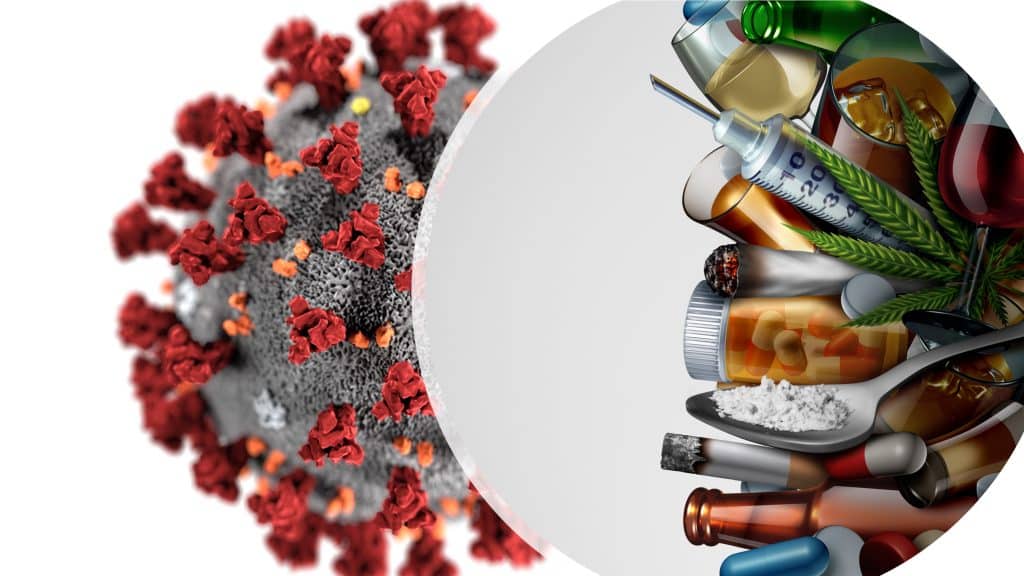
In 2020 and 2021 the United States felt the crushing blow of SARS CoV 2 and Covid 19. People around the country with pre-existing conditions lived in fear. Many people lost their lives, many still endure long lasting effects of the virus, while many others faced an unexpected collateral consequence of SARS CoV 2 and Covid 19, exacerbated drug addiction and alcoholism. Addiction ran parallel to the Covid 19 Pandemic in the United States expressing itself in various ways: Increased isolation and stress, an increased prevalence of synthetic opioids, disrupted access to addiction treatment centers and addiction treatment services, an uptick in overdose deaths and various financially related factors.
Increased Isolation and Stress from SARS CoV 2
The lockdowns and socal distancing measures implemented to curb the spread of the virus led to increased feelings of isolation and stress among many individuals exacerbated subtance abuse issues for people struggling with mental health issues. For months people were locked in their homes and were unable to go to work if they were nonessential workers. Many people who already struggled with depression, anxiety or other mental health conditions turned to drugs and alcohol. Many people who already struggled with addiction experienced relapse.
People in recovery could no longer attend in person recovery support meetings. Meetings for Alocholics Anonymous and Narcotics Anonymous were no longer allowed to meet publicly. While there were online versions of these meetings available, the value of social connection was limited and these virtual meetings just didn’t provide the same support.
To make matters worse of all the essential businesses allowed to stay open one such business type was the liquor store. For socially disconnected people, struggling with mental health issues or teetering on the edge of their own recovery looking for an outlet, many turned to drinking and thus igniting or reigniting severe alcoholism.
Increased Prevalence of Synthetic Opioids during SARS CoV 2 and Covid 19 Pandemic
During the Covid 19 pandemic there was a significant increase in the prevelence of synthetic opioids such as fentanyl. Fentanyl is a potent synthetic opioid that is 50 to 100 times more potent than morphine. Fentanyl and variations of fentanyl that included tranquilizers like xylazine beecame more readily availble than ever before. One neighborhood in the city of Philadelphia, Kensington, known for having a raw history of illicit drug activity became a seething hotbed of addicts using and buyinng these synthetic opioids. Likewise in the smaller cities and suburbs these drugs became more readily available making their abuse and dependence worse than before.
SARS CoV 2 Disrupted access to Addiction Treatment Centers
The Covid-19 pandemic disrupted access to addiction treatment in several ways:
Closure of treatment facilities: Many addiction treatment facilities, including inpatient rehab centers and outpatient clinics, were forced to close or reduce their capacity due to public health restrictions and safety concerns. This limited the availability of in-person treatment options for individuals seeking help for their addiction.
Suspension of in-person services: In-person support group meetings, therapy sessions, and other essential services for individuals in recovery were suspended or moved to virtual platforms. This disrupted the traditional support systems that are crucial for maintaining sobriety and could have made it more challenging for individuals to access the help they needed.
Limited access to medications: Some individuals in recovery rely on medications such as methadone or buprenorphine to manage their addiction. The pandemic caused disruptions in the supply chain and limited access to these medications for some individuals, making it difficult for them to continue their treatment.
Financial strain: The economic impact of the pandemic, including job loss and financial strain, made it more difficult for individuals to afford addiction treatment services or medications. This financial burden prevented some individuals from seeking the help they needed. Overall, the disruptions caused by the Covid-19 pandemic made it more challenging for individuals to access addiction treatment and support services.
SARS CoV 2 and Covid 19 Impact on Overdose Deaths
Covid 19 played a major part in increased overdose deaths. As mentioned, isolation lead to an exacerbation of addiction, and a change in drug supply led to a prevalence in synthetic opioids, but there was also reasons from an overwhelmed healthcare system. Covid 19 put a strain on healthcare systems leading to overwhelmed hospitals and emergency rooms. This strain affected the ability of healthcare providers to respond to drug overdoses promptly and effectively.
Additionally, covid 19 impacted overdose deaths through delayed and reduced access to emergency medical services. While many feared the medical system for fear of contracting the deadly virus, others simply weren’t priority against the many Covid related deaths in some of the bigger cities.
Addiction Triggering Financial Factors from SARS CoV 2 and the Pandemic
Covid 19 played a part in varying financial factors for many during the pandemic. Some people faced financial crisis after their businesses were forced to close or they were sent home from their jobs as non-essential workers. This financial strain led many to turn to drinking and drug use. Others became enriched by the many financial stimulus programs through Pandemic Unemployment Assistance and because of stress and isolation turned similarly to drugs and alcohol.
It is abundantly clear the pandemic made an already existing addiction problem worse in the United States. Two years later we are still experiencing the fallout. Fortunately, 12 step meetings and other recovery supports are now available again. Likewise, the addiction treatment centers are back open without restriction. With SARS CoV 2 and Covid 19 now being managed, there is hope that its impact on addiction will relent and many will find recovery.


















